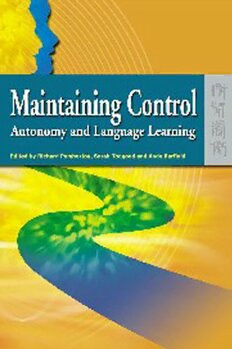
Maintaining Control: Autonomy and Language Control PDF
305 Pages·2009·1.972 MB·
Most books are stored in the elastic cloud where traffic is expensive. For this reason, we have a limit on daily download.
Preview Maintaining Control: Autonomy and Language Control
Description:
Whereas in previous decades autonomous, self-directed or 'independent' learning may have been assumed to be an alternative to classroom learning, the emphasis has now shifted to the point where learner autonomy, viewed as capacity to take charge of one’s own learning, is increasingly being promoted as a goal for general language education. Autonomy, as Phil Benson points out in his chapter, has "become part of the current orthodoxy of language teaching and learning research and practice: an idea that researchers and teachers ignore at their peril". This volume brings together a diverse body of work by leading theorists of autonomy in language education, as well as locally situated accounts by autonomy practitioners working with secondary-level, university or adult migrant learners, or engaged in teacher education and curriculum development. Localising autonomy in such settings, different views of autonomy emerge as social practice, much less an abstract set of discrete skills, attitudes or behaviours to be developed, and much more a historically and socially situated process that evolves through relations among persons-in-action in specific contexts of practice. Different authors explore learners' and teachers' voices to raise thought-provoking questions about roles, resources and practices important to any pedagogy for autonomy. Suitable for use with teachers in pre-service and in-service training, this landmark volume will also strongly appeal to teachers working in different education sectors, as well as teacher educators and researchers.
See more
The list of books you might like
Most books are stored in the elastic cloud where traffic is expensive. For this reason, we have a limit on daily download.
